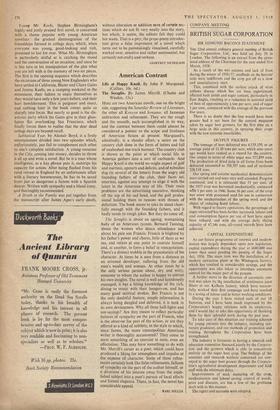American Contrast
Life at Happy Knoll. By John P. Marquand. (Collins, 10s. 6d.)
The Seraglio. Py James Merrill. (Chatto and
Windus, 15s.) • HERE are two American novels, one on the bright side, suggesting the Saturday Review of Literature, the other all Kenyon and Sewanee, all Jamesian indirection and refinement. They are the rough and the smooth, each accomplished in its way, and the contrast between them could almost be considered a pointer to the scope and liveliness of American fiction at present. Marquand's, admittedly, is a slender effort, a satire on the country club done in the form of letters and full of unabashed one-track humour. The country club is shown as the point at which social life in America gathers into a sort of carbuncle. And Happy Knoll is the world we might expect of golf and martinis, upstarts and deficits, and of subsidies dug (in several of the letters) from the angry old founding fathers of the club, their faces set, emeritus, against• any attempt to align it with the latest in the American way of life. Their main problems are the advertising executive, thinking off the top of his sad head, and the golf profes- sional holding them to ransom with threats of defection. The book seems to take its stand cheer- fully enough with the founding fathers, and it badly needs its rough jokes. But they do come off.
The Seraglio is about an ageing, womanising baby of an American tycoon, Bernard Tanning, about the women who dance attendance and about his pale son Francis. Francis is blighted by his father's power and charm, little of them as we see, and retires at one point to castrate himself and, at another, to form a belief in reincarnation. There's a distinct wobble in the presentation of his character. At times he is seen from a distance as an arrested developer, suffering from the old man's wealth and women. At other times he is the only serious person about, dry and witty, someone to whom the author is happy to entrust his own insights. The novel is well and fastidiously managed, it has a biting knowledge of the rich, dining to music with their hangers-on, and has many good satirical strokes. But Francis is not the only doubtful feature, simple information is always being dangled and deferred, it is sunk in its own deviousness. Why all these half-lights and not-sayings? Are they meant to reflect particular failures of sympathy on the part of Francis, who is the observer for part of the action, or are they offered as a kind of subtlety, in the style to which, since James, the more cosmopolitan American writer is thoroughly accustomed? They come to seem something of an exercise in taste, even an affectation. This may have 'something to do with Mr. Merrill's career as a poet, which could have
produced a liking for atmosphere and impulse at the expense of character. Some of these refine- ments certainly look like false refinements, failures of sympathy on the part of the author himself, or a diversion of his interest away from the estab- lished subject into a poet's pursuit of local effects and formal elegance. There, in fact, the novel has considerable appeal.
KARL MILLER






























 Previous page
Previous page